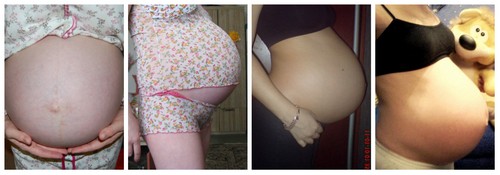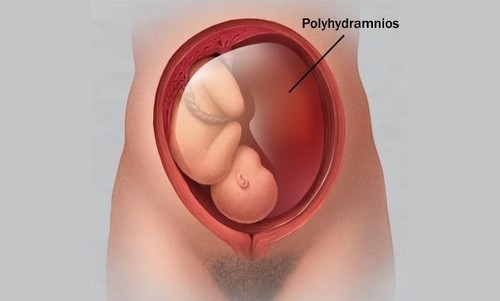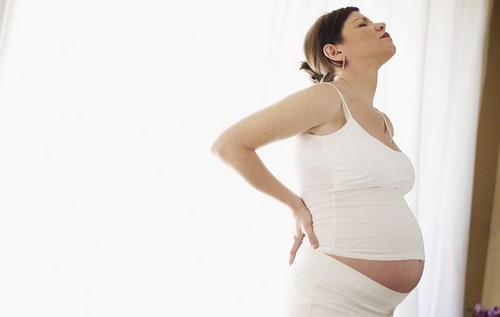The size of the fetus at the thirty-seventh week of pregnancy from the top of the head to the sacrum is about 36 cm, and its growth is approximately equal to 48 cm. Each week, the baby grows, on average, by a centimeter. Now his head and stomach in a circle are approximately equal.
The development of the fetus at 37 weeks of pregnancy, primarily aimed at improving all of its internal organs and systems. The baby does not grow by leaps and bounds! He is actively growing, so now you can understand whether a tiny or a hero will be born.
The weight of the child at 37 weeks of gestation is 2800-3000 g. Mass gain occurs primarily due to the accumulation of subcutaneous fat. It is he who will help the baby in the first days after the birth, until you have the lactation process adjusted.
Of course, these are average indicators. In fact, at this time, the size of the fetus is individual and determined by heredity.
Therefore, it is logical if the high parents have the baby larger than their peers at the time of birth, and the lower parents, respectively, have less.

What are the changes in the development of the child
Surely you will be curious to know what happens at 37 weeks of gestation if the baby is already ready for passage through the birth canal.
So:
- Skin and nails. The baby’s skin becomes denser and smoother due to the accumulation of fat cells under it. The nails have grown to the tips of the fingers. Sometimes a baby can inadvertently scratch himself. The lanugo fluff almost disappeared from the skin surface, remaining only in the shoulders and back. Primary lubricant accumulates mainly only in folds on the body;
- Cartilage tissue. The degree of maturity of the fetus is determined by how stiff the cartilages of its nose and ears have become. If earlier the auricles did not bend at all, now they have become much more elastic and denser;
- Fontanel. The skull of the fetus is not completely stiff. Two small soft areas (fontanel) remain open so that the head can easily slip through the birth canal. The fontanelles will completely close a bit later;
- Respiratory system. The formation of the lungs has completed, so the baby will be ready to take his first independent breath after birth. In addition, the hormone cortisone begins to be produced in his body, which contributes to the full development of the respiratory system. The production of a surfactant (a substance that prevents the adhesion of the lungs) also continues;
- Endocrine system. The adrenal glands are larger than the kidneys. They intensively produce hormones that will protect the baby’s nervous system from stress at the time of birth;
- Nervous system. The process of its formation will continue after birth. The grasping and sucking reflexes are now best developed; the development of others will occur gradually over time;
- Digestive system. The gastrointestinal mucosa is covered with villi, which will be responsible for the absorption of nutrients. And in the stomach, the first contractile movements necessary for digesting food are already taking place. The intestines, meanwhile, are filled with the first feces – meconium, which will be released a few hours after birth.
Active movements and movements of the baby
The fetus continues to grow at 37 weeks of gestation. His legs abut and painfully kick your rib cage if he lies head down. If the position of the fetus is incorrect (butt down or across), then he still has time to turn around, although this will not be so simple to accomplish.

The movements are active and very noticeable. Of course, the baby does not have space for somersaults, but he can toss and turn to the best of his ability. By movements and behavior can be judged on his condition. The child should not both turn around sharply and kick too often. The norm is 10 movements in 12 hours.
With any questions regarding the activity of the fetus, you can always contact your gynecologist.
Well-being of the future mother for a period of 37 weeks
The most difficult physical period has come for you. It’s hard for you to move around, your stomach has become simply huge, the skin on it has been very stretched and itchy, the navel sticks out… It is important not to give in to despondency, although sometimes it seems that the last weeks of pregnancy will last forever, making the expectation of the baby more and more tiring. Of course, you are tired, but tolerate quite a bit!
In primiparous women, the baby’s head at this time already lowers into the pelvic area, so breathing becomes easier. But the toilet, alas, pulls even stronger.
It will take quite a bit of time, and with nostalgia and special trepidation you will remember your current state.
Symptoms and feelings of pregnancy
Sensations and symptoms at 37 weeks of gestation are possible as follows:
- Pain in the lower abdomen and in the lower back. It is associated with the fact that the baby is preparing for childbirth, going down and squeezing your muscles in the pelvic area. It feels like tension after a prolonged swing of the press;
- Relief. Thanks to the omission of the uterus, pressure on the diaphragm is relieved, it stops bothering heartburn;
- Frequent urination. Sometimes the desire to go to the toilet becomes simply unbearable, so try not to get stuck in traffic jams. Tolerate by delaying the emptying of the bladder is unacceptable. This is fraught with the development of infection;
- Rapid bowel movements. Keep in mind that digestive upset (namely diarrhea) most often indicates an approaching birth. So nature itself takes care of cleansing the intestines so that it does not interfere with the natural appearance of the baby in the light. If, before entering the maternity hospital, your intestines have not cleared on their own, do not rush to categorically refuse an enema. Of course, this procedure is not necessary at all! However, it is more likely to be ethical and necessary to prevent bowel movements during attempts. However, such a moment should not cause you any embarrassment, because he is familiar to the medical staff;
- Tearfulness and irritability. After listening to various “horror stories” about childbirth, you may begin to scare the near future. Always remember that every birth is unique! And also, to be afraid is normal. Try to treat everything calmly and without panic. Understand what exactly scares you in the birth process in order to overcome your fears;
- Training fights. Now they can increase even more. The time has come to learn to distinguish them from true labor pains during childbirth (the second are more frequent and painful).
Your weight and belly size
The uterus rises above the navel by about 16-17 cm, and above the pubic joint – by 37 cm. Its total volume is about 4-5 liters. By this period, your weight has increased by 11-14 kg from the original. Moreover, most of them are the fetus, then there is blood, amniotic fluid, the placenta, as well as your uterus, chest and hips. Now, on a weekly basis, you gain an average of 150 g.
This is the look of the belly of other pregnant women who are on the same date as you are now:

Important medical examinations
Thirty-seventh obstetric week of pregnancy is the ninth month of your excellent condition. Visit the antenatal clinic and take tests will have, as before, weekly. At the appointment, the doctor will not conduct a gynecological examination, but he will check your weight, examine your limbs for swelling, measure the circumference of the abdomen, the height of the bottom of the uterus and blood pressure.
If protein is found in the urine or blood pressure is elevated, the gynecologist may suggest early hospitalization. Refuse it is not worth it. In the presence of any deviations, it is advisable to be under the supervision of medical personnel.
Internal cervical examination
The doctor may suggest conducting such a study in order to determine the degree of readiness of the uterus for childbirth. It also evaluates the location, length, and density of the cervix.
Throughout pregnancy, the pharynx is completely closed or may be ajar by 1 cm. During natural birth, it opens by 10 cm. This is enough to allow the baby’s head to go out.
Ultrasound Results
According to the testimony, an ultrasound can be prescribed at the thirty-seventh week of pregnancy. Its results allow the doctor, who will take birth, to determine the tactics of their management and the timing. If you are given a cesarean section, then hospitalization will occur this week.
Possible complications at week 37
Thirty-seventh week of pregnancy often often finally decides whether you should tune in to natural birth or prepare for surgery. Caesarean section is indicated in such cases:
- Pelvic presentation of the fetus;
- Low water, high water;
- Placenta previa;
- Hypoxia of the fetus.
Now it is especially important to carefully monitor your condition. If you have high blood pressure, a headache, or swelling on your arms and legs, you should talk to your doctor about this! In addition, a runny nose or fever due to the common cold can cause the baby to be excommunicated for some time after giving birth. And giving birth with a cold is not easy. Remember, you need to take care!
Let’s talk directly about childbirth
It is important to learn to recognize the first signs of childbirth and, in fact, the beginning of labor, in order to be able to respond to them in time.
Harbingers of the coming birth
Summing up all of the above, we can distinguish the following precursors of the approaching birth:
- Stomach fell;
- Pelvic pressure increased;
- Unpleasant tingling of the pubis began;
- Drawing pain in the lower back intensified;
- Digestive upset;
- The mucous plug, which closed the entrance to the uterus, departed (plentiful viscous mucous secretions began);
- The motor activity of the fetus decreased, but ultrasound records its normal heartbeat;
- Your weight has begun to decline.
How to determine the onset of labor
You have started giving birth if:
Amniotic fluid overflowed. Urgently take a lying position and call an ambulance! After the water leaves, the baby will not swim in his usual environment, but will be in a dry and cramped space. To avoid complications, urgent stimulation of labor is required.
The regularity and strength of contractions has increased. A baby is born in a few minutes, alas, only in films. In fact, the duration of the first birth can be about 12-14 hours, of which only 1-2 hours are released for frequent active and painful contractions during labor. If contractions become more frequent:
- walk around the room;
- have some tea;
- double-check whether you have prepared all the things for the trip to the hospital;
- contact your husband, call a taxi service or call an ambulance.
It is not recommended that you drive yourself! Your task is to tune in to a positive outcome.
Useful tips for expectant mothers
At 37 weeks of gestation, the following recommendations are relevant:
- Soon you will rock your baby in your arms and sing lullabies to him. So why not start singing now? You can also listen to pleasant soothing music;
- Iron your tummy more often and talk with the baby. If possible, take a walk in the fresh air;
- Protect yourself from accidental bumps and falls. Take special care in the bathroom (put a rubber mat on the floor) and in crowded places (it is advisable to avoid them altogether);
- The instinct of “nesting” can take hold of you even more. If you suddenly want to put things in order in the pantry, sort out things on the mezzanine, throw all the excess out of the house, remember, the main thing is not to overwork! Before giving birth, it is better to gain strength. The sleepless nights associated with caring for a newborn are very close !;
- Try to sleep on your left side. So the uterus and the fetus are provided with the necessary amount of oxygen. This allows the baby to sleep harder and less to push. Lay your feet on a pillow to avoid swelling;
- Learn the right breath – it will help a lot during childbirth !;
- Relax more, read, do what you love;
- If you still haven’t decided on a maternity hospital, it’s time to come to grips with this issue. At 37-38 weeks, an acquaintance with a doctor usually takes place, who will take birth. All points of interest to you can be clarified with him. In addition, discuss the option of parturient birth in advance with both your doctor and husband.
This material is for informational purposes only, before using the information provided it is necessary to consult with a specialist.



